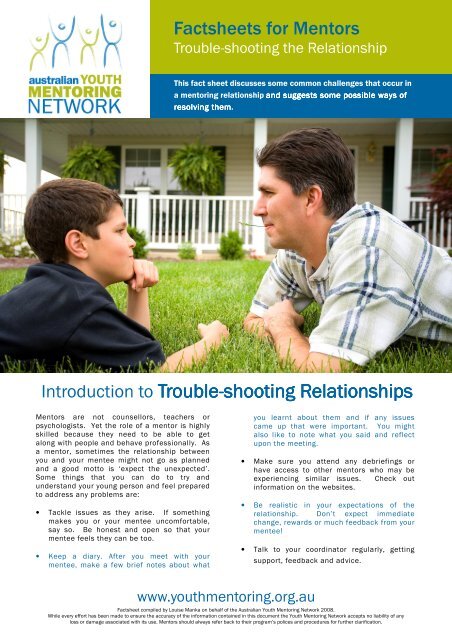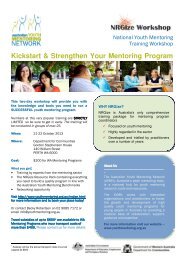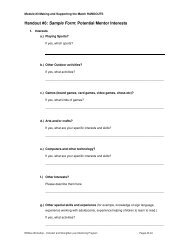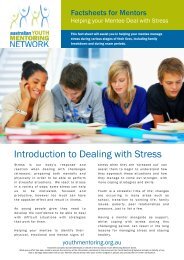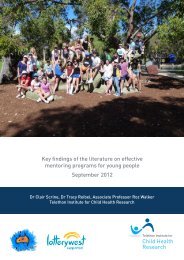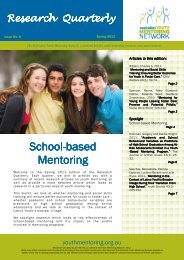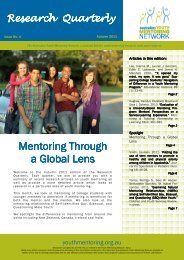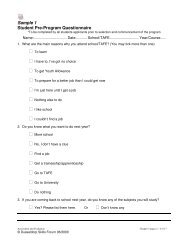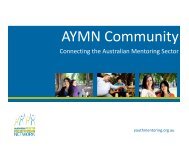Fact Sheet 4 - Trouble Shooting the Relationship.pub - Australian ...
Fact Sheet 4 - Trouble Shooting the Relationship.pub - Australian ...
Fact Sheet 4 - Trouble Shooting the Relationship.pub - Australian ...
You also want an ePaper? Increase the reach of your titles
YUMPU automatically turns print PDFs into web optimized ePapers that Google loves.
<strong>Fact</strong>sheets for Mentors<strong>Trouble</strong>-shooting <strong>the</strong> <strong>Relationship</strong>This fact sheet discusses some common challenges that occur ina mentoring relationship and suggests some possible ways ofresolving <strong>the</strong>m.Introduction to <strong>Trouble</strong><strong>Trouble</strong>-shooting <strong>Relationship</strong>sMentors are not counsellors, teachers orpsychologists. Yet <strong>the</strong> role of a mentor is highlyskilled because <strong>the</strong>y need to be able to getalong with people and behave professionally. Asa mentor, sometimes <strong>the</strong> relationship betweenyou and your mentee might not go as plannedand a good motto is ‘expect <strong>the</strong> unexpected’.Some things that you can do to try andunderstand your young person and feel preparedto address any problems are:• Tackle issues as <strong>the</strong>y arise. If somethingmakes you or your mentee uncomfortable,say so. Be honest and open so that yourmentee feels <strong>the</strong>y can be too.• Keep a diary. After you meet with yourmentee, make a few brief notes about whatyou learnt about <strong>the</strong>m and if any issuescame up that were important. You mightalso like to note what you said and reflectupon <strong>the</strong> meeting.• Make sure you attend any debriefings orhave access to o<strong>the</strong>r mentors who may beexperiencing similar issues. Check outinformation on <strong>the</strong> websites.• Be realistic in your expectations of <strong>the</strong>relationship. Don’t expect immediatechange, rewards or much feedback from yourmentee!• Talk to your coordinator regularly, gettingsupport, feedback and advice.www.youthmentoring.org.au<strong>Fact</strong>sheet compiled by Louise Manka on behalf of <strong>the</strong> <strong>Australian</strong> Youth Mentoring Network 2008.While every effort has been made to ensure <strong>the</strong> accuracy of <strong>the</strong> information contained in this document <strong>the</strong> Youth Mentoring Network accepts no liability of anyloss or damage associated with its use. Mentors should always refer back to <strong>the</strong>ir program’s polices and procedures for fur<strong>the</strong>r clarification.
My mentee is rude, disrespectful andkeeps sneaking off for cigarettes• Discuss your expectations of your relationshipand how this situation makes you feel. Usesome “I” statements, for example, “When youspeak to me rudely I feel that my time is notappreciated and what I would like is for you tospeak to me respectfully”.• Set some realistic boundaries toge<strong>the</strong>r eg. Ifappropriate for age/meeting place, can youbuild a break in your time toge<strong>the</strong>r so that <strong>the</strong>ycan go and have a cigarette? Do you need toreduce <strong>the</strong> length of your meeting time? Ifhaving a cigarette is not appropriate, explainto your mentee why it isn’t and that you needto make an agreement about not smoking.• Assess your own expectations and behaviour.Are you pushing your student too much, toosoon? Are you role modelling <strong>the</strong> behaviourthat you desire? Work toge<strong>the</strong>r to try andenvision <strong>the</strong> kind of relationship you want.• Do not expect immediate changes, give it timeand make sure you notice when your youngperson does <strong>the</strong> right thing. Use lots ofencouragement and focus on <strong>the</strong> positives.Assess your own expectationsand behaviour. Are you pushingyour mentee too much, toosoon?Many young people have issues that can seeminsurmountable to <strong>the</strong>m and it is very difficult for<strong>the</strong>m to learn to communicate <strong>the</strong>ir hurt,frustration and anger appropriately. Respond to<strong>the</strong> feelings behind <strong>the</strong> behaviour ra<strong>the</strong>r thanreact to <strong>the</strong> behaviour. For example, “You seemupset about something today, are you ok?” Dealwith emotion and get settled down, <strong>the</strong>n discusshow it could be managed differently next time.
My mentee seemsbored and notinterested in whatwe are doing• Ask your mentee if <strong>the</strong>re is something else<strong>the</strong>y would ra<strong>the</strong>r be doing or if <strong>the</strong>re is aproblem, for example, <strong>the</strong>y may be hungrywhich is a common cause of lack of focus!• Go and have some fun toge<strong>the</strong>r! (See FACTSHEET - Getting to know your mentee).• Go and do something physical, <strong>the</strong>y might justneed to get out, be having a bad day, or needa break.• Revisit program goals and mentee and mentorinterests and get <strong>the</strong>m to choose somethingfrom <strong>the</strong> list.• Ask your program coordinator for helpSometimes it is difficult to find <strong>the</strong> reason forwhy a mentee gets bored but it may not haveanything to do with you, and <strong>the</strong>y may not wish toshare <strong>the</strong> reason. It might be <strong>the</strong>y have had arelationship break up or issues at home and <strong>the</strong>yare having trouble focussing. As a mentor,sometimes <strong>the</strong> focus can be on <strong>the</strong> achievementof a project or goal and it may be necessary torefocus on <strong>the</strong> relationship.Am I making adifference?Are you always doing all <strong>the</strong> work to get toge<strong>the</strong>r?Maybe you think your mentee doesn’t have <strong>the</strong>courage to tell you <strong>the</strong>y don’t want to meet anymore or you just don’t think you are making adifference.• Most mentees don’t initiate contact and itreally is up to <strong>the</strong> mentor to take <strong>the</strong>responsibility for this, as hard as it may seemsometimes (see FACT SHEET – Building <strong>the</strong><strong>Relationship</strong>).• If you are concerned about whe<strong>the</strong>r <strong>the</strong>y wantto keep meeting with you, think aboutwhe<strong>the</strong>r <strong>the</strong>y are pleased to see you, do <strong>the</strong>yengage when <strong>the</strong>y are with you? Are <strong>the</strong>ywaiting for you when you turn up to meet<strong>the</strong>m?More information for MENTORS can be found on <strong>the</strong>AUSTRALIAN YOUTH MENTORING NETWORK Website under <strong>the</strong> Information forMentors page www.youthmentoring.org.au/info-forfor-mentors.html
• Most mentees would never tell you that <strong>the</strong>ylike meeting with you or that <strong>the</strong>y have learntanything or that you are making <strong>the</strong>m feelbetter about <strong>the</strong>mselves. To be able tocommunicate in this open way requiresconfidence and skill and many mentees justcan’t do it even if <strong>the</strong>y want to.My mentee never seems tomake any effort to contact me, Iam always doing all <strong>the</strong> work toget us toge<strong>the</strong>r. Maybe <strong>the</strong>yjust don’t have <strong>the</strong> courage totell me <strong>the</strong>y don’t want to meetany more? I just don’t think Iam making any difference• You need to believe you are making adifference, don’t expect to see obviouschanges or have everyone tell you what <strong>the</strong>yhave noticed. For some mentees, just <strong>the</strong> factthat you turn up each week, rebuilds <strong>the</strong>irtrust, for o<strong>the</strong>rs, being able to explore apassion injects much needed confidence.If you really have concerns about yourrelationship with your mentee seek help fromyour coordinator who will be able to advise you.Try and look at all sides of <strong>the</strong> situation andagain assess your expectations. Remember thatmentoring can be frustrating, confusing anddifficult, and may not always work out how youplanned. The relationship is about supporting andhelping a young person to grow, and although itusually is a deeply fulfilling experience it cansometimes feel unrecognised.References & Fur<strong>the</strong>r Information• Understanding Adolescent Behaviourwww.focusonyouth.com/<strong>the</strong>rapy_issues.php?nID=19• Mentoring-workswww.mentoring-works.com• <strong>Australian</strong> Youth Mentoring Networkwww.youthmentoring.org.auwww.youthmentoring.org.au


